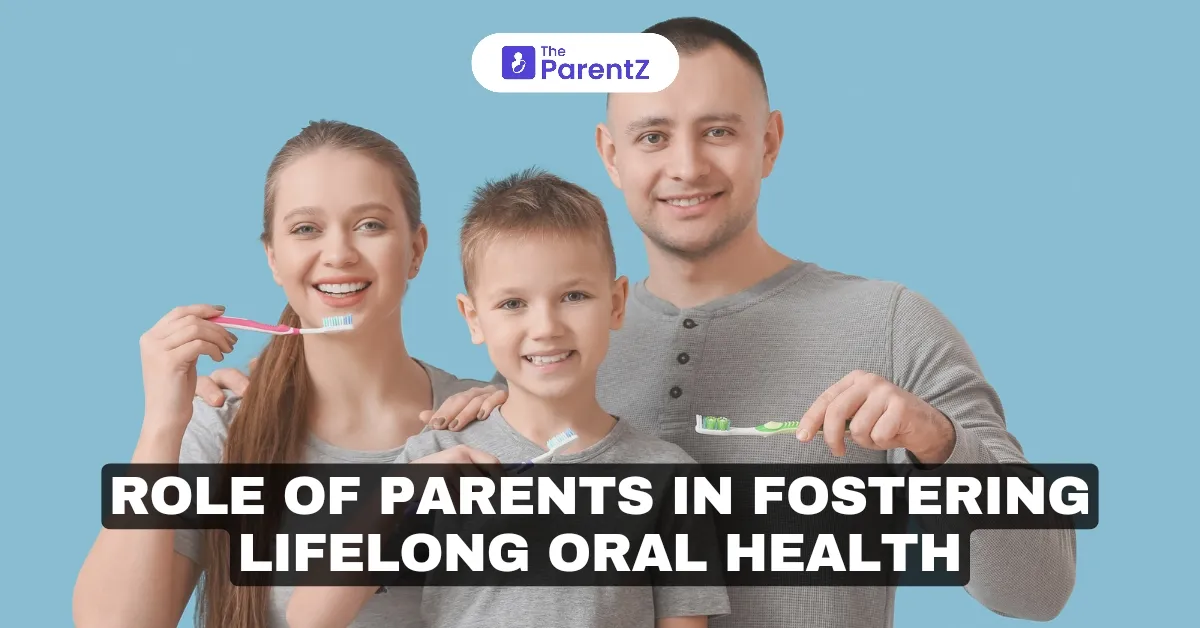Good dental care starts at home, and parents are pivotal in shaping lifelong oral hygiene habits in children. By teaching proper brushing, flossing, and healthy eating, parents can instil habits that prevent cavities, gum disease, and other dental issues.
Why Parental Involvement Matters
Children learn by observing and mimicking their parents. By modeling good oral hygiene and actively participating in their dental care routine, parents:
• Create a strong foundation for lifelong oral health.
• Reduce the risk of dental issues like cavities and gum disease.
• Build positive attitudes toward oral hygiene and regular dental visits.
1. Teaching Oral Hygiene Basics
Brushing
• Start cleaning your baby’s gums with a soft, damp cloth even before teeth emerge.
• Once teeth appear, introduce a soft-bristled toothbrush with a smear of fluoride toothpaste.
• Teach children to brush for two minutes, twice a day, using circular motions.
• Supervise brushing until children are around 7–8 years old to ensure proper technique.
Flossing
• Begin flossing once your child’s teeth touch. Use floss picks for convenience and guide them until they can floss independently.
Mouth Rinsing
• Introduce an alcohol-free, fluoride-based mouth rinse for older children as recommended by their dentist.
2. Modeling Good Oral Hygiene Practices
Children are more likely to adopt healthy habits if they see their parents doing the same.
• Brush and floss alongside your child to demonstrate proper techniques.
• Avoid skipping your own oral hygiene routine, as children notice inconsistencies.
• Maintain regular dental visits for the entire family.
3. Encouraging a Balanced Diet for Dental Health
Diet plays a crucial role in oral health. Parents can:
• Offer tooth-friendly snacks like fresh fruits, vegetables, dairy products, and nuts.
• Limit sugary foods and drinks that feed cavity-causing bacteria.
• Promote water as the primary beverage, especially fluoridated tap water, to strengthen enamel.
• Incorporate calcium and vitamin D-rich foods to support strong teeth and bones.
4. Making Oral Care Fun
Parents can transform dental care from a chore into an enjoyable activity:
• Use Fun Tools: Choose toothbrushes with bright colors or favorite cartoon characters.
• Brushing Apps: Use apps or timers with music to make the two-minute brushing time engaging.
• Reward System: Create a reward chart for consistent brushing and flossing.
• Storytelling: Share stories about how “tooth heroes” fight cavities to encourage brushing.
5. Creating a Routine
Consistency is key in building habits.
• Set a fixed time each morning and evening for brushing and flossing.
• Reinforce the importance of routine, even during vacations or busy days.
• Gradually encourage children to take responsibility for their own oral hygiene as they grow.
6. Scheduling Regular Dental Visits
Parents play an essential role in ensuring regular dental check-ups:
• Schedule the first dental visit by the age of one or within six months of the first tooth eruption.
• Take your child for check-ups every six months to monitor their oral health.
• Use dental visits as opportunities to educate your child about oral hygiene and its importance.
7. Addressing Dental Fears
Some children may feel anxious about visiting the dentist. Parents can:
• Explain the purpose of dental visits in simple, positive terms.
• Read books or watch videos about friendly dentist characters.
• Avoid using negative language like “pain” or “needles” when talking about the dentist.
• Reward children for successful dental visits to build a positive association.
8. Monitoring Changes in Oral Health
Parents should be vigilant about changes in their child’s teeth or gums, such as:
• Tooth discoloration
• Redness, swelling, or bleeding gums
• Complaints of tooth sensitivity or pain
Promptly address these concerns with a dental professional to prevent complications.
Conclusion
Parents are the primary role models and guides in fostering lifelong dental care habits for their children. By teaching proper oral hygiene, modeling good practices, maintaining a balanced diet, and ensuring regular dental check-ups, parents can set their children on the path to a healthy smile. Consistent effort and encouragement from parents will help children develop a positive attitude toward oral health, benefiting them for years to come.
References
• American Dental Association. Tips for caring for your child’s teeth. Available at: www.ada.org.
• American Academy of Pediatric Dentistry. Guideline on preventive oral health care. Accessed November 2024.
• Centers for Disease Control and Prevention (CDC). Oral health for children.








Be the first one to comment on this story.